Tianbao Xie
RLAnything: Forge Environment, Policy, and Reward Model in Completely Dynamic RL System
Feb 02, 2026Abstract:We propose RLAnything, a reinforcement learning framework that dynamically forges environment, policy, and reward models through closed-loop optimization, amplifying learning signals and strengthening the overall RL system for any LLM or agentic scenarios. Specifically, the policy is trained with integrated feedback from step-wise and outcome signals, while the reward model is jointly optimized via consistency feedback, which in turn further improves policy training. Moreover, our theory-motivated automatic environment adaptation improves training for both the reward and policy models by leveraging critic feedback from each, enabling learning from experience. Empirically, each added component consistently improves the overall system, and RLAnything yields substantial gains across various representative LLM and agentic tasks, boosting Qwen3-VL-8B-Thinking by 9.1% on OSWorld and Qwen2.5-7B-Instruct by 18.7% and 11.9% on AlfWorld and LiveBench, respectively. We also that optimized reward-model signals outperform outcomes that rely on human labels. Code: https://github.com/Gen-Verse/Open-AgentRL
OpenCUA: Open Foundations for Computer-Use Agents
Aug 12, 2025Abstract:Vision-language models have demonstrated impressive capabilities as computer-use agents (CUAs) capable of automating diverse computer tasks. As their commercial potential grows, critical details of the most capable CUA systems remain closed. As these agents will increasingly mediate digital interactions and execute consequential decisions on our behalf, the research community needs access to open CUA frameworks to study their capabilities, limitations, and risks. To bridge this gap, we propose OpenCUA, a comprehensive open-source framework for scaling CUA data and foundation models. Our framework consists of: (1) an annotation infrastructure that seamlessly captures human computer-use demonstrations; (2) AgentNet, the first large-scale computer-use task dataset spanning 3 operating systems and 200+ applications and websites; (3) a scalable pipeline that transforms demonstrations into state-action pairs with reflective long Chain-of-Thought reasoning that sustain robust performance gains as data scales. Our end-to-end agent models demonstrate strong performance across CUA benchmarks. In particular, OpenCUA-32B achieves an average success rate of 34.8% on OSWorld-Verified, establishing a new state-of-the-art (SOTA) among open-source models and surpassing OpenAI CUA (GPT-4o). Further analysis confirms that our approach generalizes well across domains and benefits significantly from increased test-time computation. We release our annotation tool, datasets, code, and models to build open foundations for further CUA research.
xbench: Tracking Agents Productivity Scaling with Profession-Aligned Real-World Evaluations
Jun 16, 2025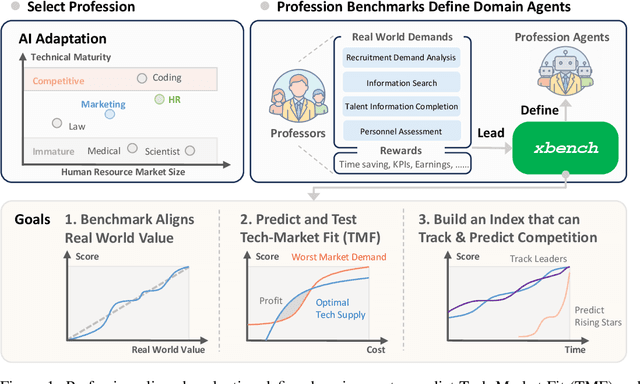

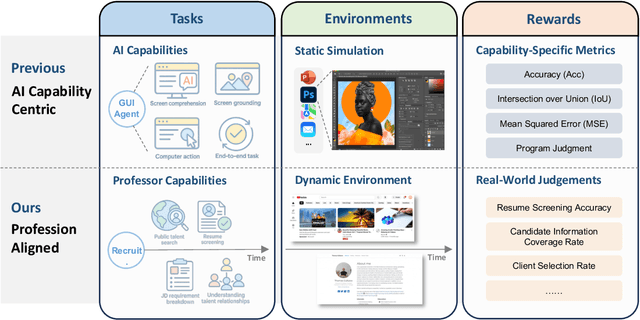
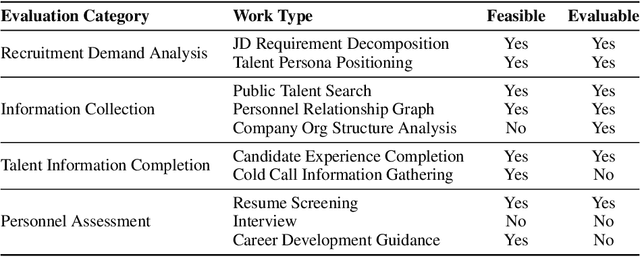
Abstract:We introduce xbench, a dynamic, profession-aligned evaluation suite designed to bridge the gap between AI agent capabilities and real-world productivity. While existing benchmarks often focus on isolated technical skills, they may not accurately reflect the economic value agents deliver in professional settings. To address this, xbench targets commercially significant domains with evaluation tasks defined by industry professionals. Our framework creates metrics that strongly correlate with productivity value, enables prediction of Technology-Market Fit (TMF), and facilitates tracking of product capabilities over time. As our initial implementations, we present two benchmarks: Recruitment and Marketing. For Recruitment, we collect 50 tasks from real-world headhunting business scenarios to evaluate agents' abilities in company mapping, information retrieval, and talent sourcing. For Marketing, we assess agents' ability to match influencers with advertiser needs, evaluating their performance across 50 advertiser requirements using a curated pool of 836 candidate influencers. We present initial evaluation results for leading contemporary agents, establishing a baseline for these professional domains. Our continuously updated evalsets and evaluations are available at https://xbench.org.
ScienceBoard: Evaluating Multimodal Autonomous Agents in Realistic Scientific Workflows
May 26, 2025



Abstract:Large Language Models (LLMs) have extended their impact beyond Natural Language Processing, substantially fostering the development of interdisciplinary research. Recently, various LLM-based agents have been developed to assist scientific discovery progress across multiple aspects and domains. Among these, computer-using agents, capable of interacting with operating systems as humans do, are paving the way to automated scientific problem-solving and addressing routines in researchers' workflows. Recognizing the transformative potential of these agents, we introduce ScienceBoard, which encompasses two complementary contributions: (i) a realistic, multi-domain environment featuring dynamic and visually rich scientific workflows with integrated professional software, where agents can autonomously interact via different interfaces to accelerate complex research tasks and experiments; and (ii) a challenging benchmark of 169 high-quality, rigorously validated real-world tasks curated by humans, spanning scientific-discovery workflows in domains such as biochemistry, astronomy, and geoinformatics. Extensive evaluations of agents with state-of-the-art backbones (e.g., GPT-4o, Claude 3.7, UI-TARS) show that, despite some promising results, they still fall short of reliably assisting scientists in complex workflows, achieving only a 15% overall success rate. In-depth analysis further provides valuable insights for addressing current agent limitations and more effective design principles, paving the way to build more capable agents for scientific discovery. Our code, environment, and benchmark are at https://qiushisun.github.io/ScienceBoard-Home/.
Scaling Computer-Use Grounding via User Interface Decomposition and Synthesis
May 19, 2025Abstract:Graphical user interface (GUI) grounding, the ability to map natural language instructions to specific actions on graphical user interfaces, remains a critical bottleneck in computer use agent development. Current benchmarks oversimplify grounding tasks as short referring expressions, failing to capture the complexity of real-world interactions that require software commonsense, layout understanding, and fine-grained manipulation capabilities. To address these limitations, we introduce OSWorld-G, a comprehensive benchmark comprising 564 finely annotated samples across diverse task types including text matching, element recognition, layout understanding, and precise manipulation. Additionally, we synthesize and release the largest computer use grounding dataset Jedi, which contains 4 million examples through multi-perspective decoupling of tasks. Our multi-scale models trained on Jedi demonstrate its effectiveness by outperforming existing approaches on ScreenSpot-v2, ScreenSpot-Pro, and our OSWorld-G. Furthermore, we demonstrate that improved grounding with Jedi directly enhances agentic capabilities of general foundation models on complex computer tasks, improving from 5% to 27% on OSWorld. Through detailed ablation studies, we identify key factors contributing to grounding performance and verify that combining specialized data for different interface elements enables compositional generalization to novel interfaces. All benchmark, data, checkpoints, and code are open-sourced and available at https://osworld-grounding.github.io.
Qwen2.5-VL Technical Report
Feb 19, 2025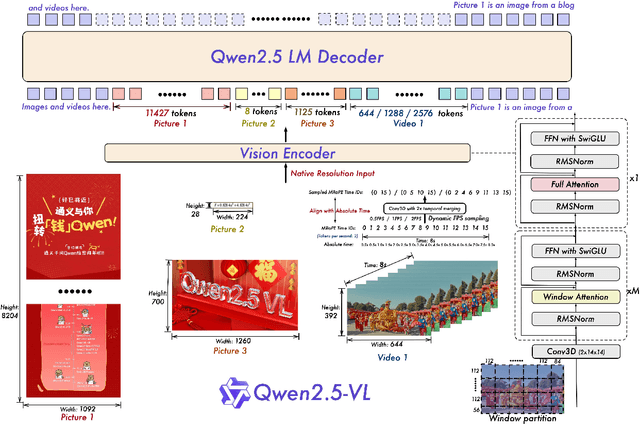
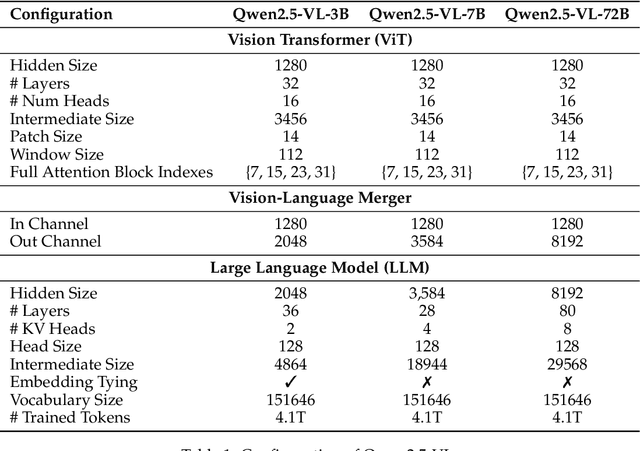

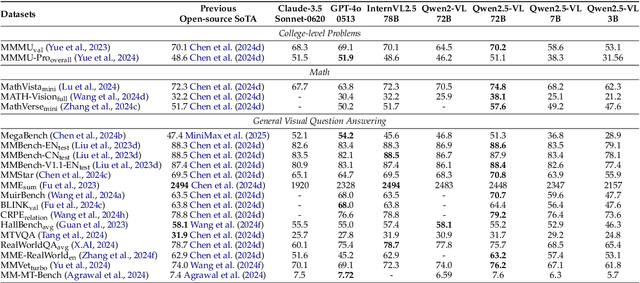
Abstract:We introduce Qwen2.5-VL, the latest flagship model of Qwen vision-language series, which demonstrates significant advancements in both foundational capabilities and innovative functionalities. Qwen2.5-VL achieves a major leap forward in understanding and interacting with the world through enhanced visual recognition, precise object localization, robust document parsing, and long-video comprehension. A standout feature of Qwen2.5-VL is its ability to localize objects using bounding boxes or points accurately. It provides robust structured data extraction from invoices, forms, and tables, as well as detailed analysis of charts, diagrams, and layouts. To handle complex inputs, Qwen2.5-VL introduces dynamic resolution processing and absolute time encoding, enabling it to process images of varying sizes and videos of extended durations (up to hours) with second-level event localization. This allows the model to natively perceive spatial scales and temporal dynamics without relying on traditional normalization techniques. By training a native dynamic-resolution Vision Transformer (ViT) from scratch and incorporating Window Attention, we reduce computational overhead while maintaining native resolution. As a result, Qwen2.5-VL excels not only in static image and document understanding but also as an interactive visual agent capable of reasoning, tool usage, and task execution in real-world scenarios such as operating computers and mobile devices. Qwen2.5-VL is available in three sizes, addressing diverse use cases from edge AI to high-performance computing. The flagship Qwen2.5-VL-72B model matches state-of-the-art models like GPT-4o and Claude 3.5 Sonnet, particularly excelling in document and diagram understanding. Additionally, Qwen2.5-VL maintains robust linguistic performance, preserving the core language competencies of the Qwen2.5 LLM.
Aguvis: Unified Pure Vision Agents for Autonomous GUI Interaction
Dec 05, 2024



Abstract:Graphical User Interfaces (GUIs) are critical to human-computer interaction, yet automating GUI tasks remains challenging due to the complexity and variability of visual environments. Existing approaches often rely on textual representations of GUIs, which introduce limitations in generalization, efficiency, and scalability. In this paper, we introduce Aguvis, a unified pure vision-based framework for autonomous GUI agents that operates across various platforms. Our approach leverages image-based observations, and grounding instructions in natural language to visual elements, and employs a consistent action space to ensure cross-platform generalization. To address the limitations of previous work, we integrate explicit planning and reasoning within the model, enhancing its ability to autonomously navigate and interact with complex digital environments. We construct a large-scale dataset of GUI agent trajectories, incorporating multimodal reasoning and grounding, and employ a two-stage training pipeline that first focuses on general GUI grounding, followed by planning and reasoning. Through comprehensive experiments, we demonstrate that Aguvis surpasses previous state-of-the-art methods in both offline and real-world online scenarios, achieving, to our knowledge, the first fully autonomous pure vision GUI agent capable of performing tasks independently without collaboration with external closed-source models. We open-sourced all datasets, models, and training recipes to facilitate future research at https://aguvis-project.github.io/.
AgentStore: Scalable Integration of Heterogeneous Agents As Specialized Generalist Computer Assistant
Oct 24, 2024Abstract:Digital agents capable of automating complex computer tasks have attracted considerable attention due to their immense potential to enhance human-computer interaction. However, existing agent methods exhibit deficiencies in their generalization and specialization capabilities, especially in handling open-ended computer tasks in real-world environments. Inspired by the rich functionality of the App store, we present AgentStore, a scalable platform designed to dynamically integrate heterogeneous agents for automating computer tasks. AgentStore empowers users to integrate third-party agents, allowing the system to continuously enrich its capabilities and adapt to rapidly evolving operating systems. Additionally, we propose a novel core \textbf{MetaAgent} with the \textbf{AgentToken} strategy to efficiently manage diverse agents and utilize their specialized and generalist abilities for both domain-specific and system-wide tasks. Extensive experiments on three challenging benchmarks demonstrate that AgentStore surpasses the limitations of previous systems with narrow capabilities, particularly achieving a significant improvement from 11.21\% to 23.85\% on the OSWorld benchmark, more than doubling the previous results. Comprehensive quantitative and qualitative results further demonstrate AgentStore's ability to enhance agent systems in both generalization and specialization, underscoring its potential for developing the specialized generalist computer assistant. All our codes will be made publicly available in https://chengyou-jia.github.io/AgentStore-Home.
Spider2-V: How Far Are Multimodal Agents From Automating Data Science and Engineering Workflows?
Jul 15, 2024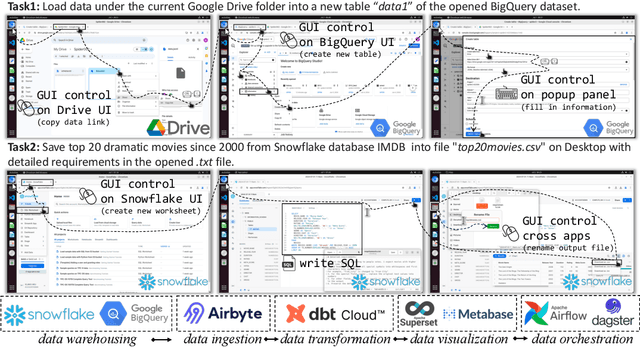
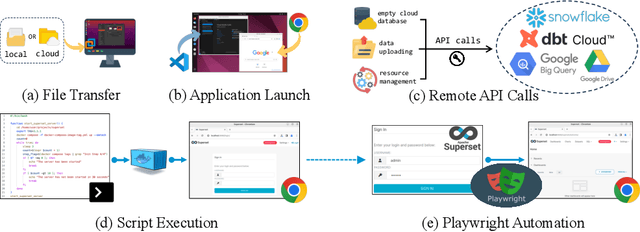
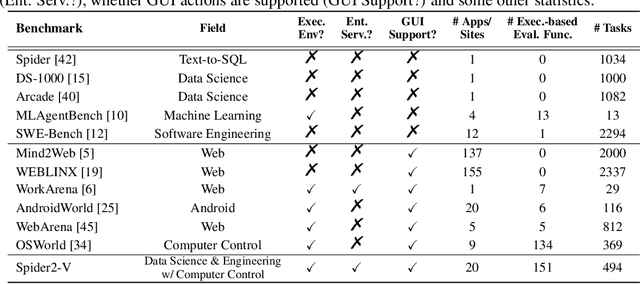
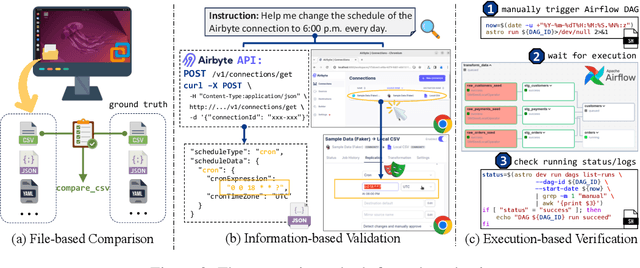
Abstract:Data science and engineering workflows often span multiple stages, from warehousing to orchestration, using tools like BigQuery, dbt, and Airbyte. As vision language models (VLMs) advance in multimodal understanding and code generation, VLM-based agents could potentially automate these workflows by generating SQL queries, Python code, and GUI operations. This automation can improve the productivity of experts while democratizing access to large-scale data analysis. In this paper, we introduce Spider2-V, the first multimodal agent benchmark focusing on professional data science and engineering workflows, featuring 494 real-world tasks in authentic computer environments and incorporating 20 enterprise-level professional applications. These tasks, derived from real-world use cases, evaluate the ability of a multimodal agent to perform data-related tasks by writing code and managing the GUI in enterprise data software systems. To balance realistic simulation with evaluation simplicity, we devote significant effort to developing automatic configurations for task setup and carefully crafting evaluation metrics for each task. Furthermore, we supplement multimodal agents with comprehensive documents of these enterprise data software systems. Our empirical evaluation reveals that existing state-of-the-art LLM/VLM-based agents do not reliably automate full data workflows (14.0% success). Even with step-by-step guidance, these agents still underperform in tasks that require fine-grained, knowledge-intensive GUI actions (16.2%) and involve remote cloud-hosted workspaces (10.6%). We hope that Spider2-V paves the way for autonomous multimodal agents to transform the automation of data science and engineering workflow. Our code and data are available at https://spider2-v.github.io.
OSWorld: Benchmarking Multimodal Agents for Open-Ended Tasks in Real Computer Environments
Apr 11, 2024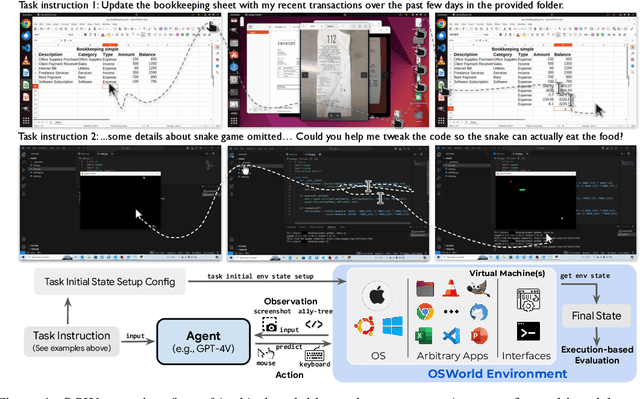
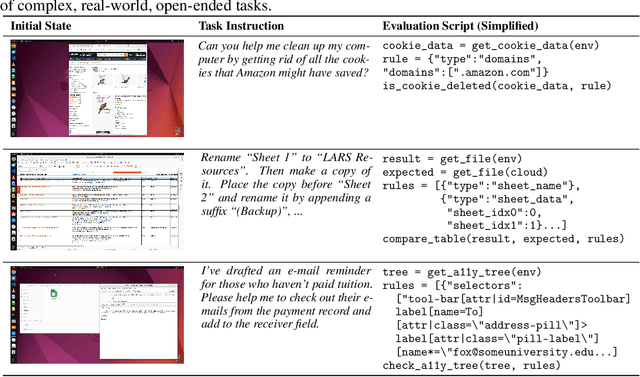
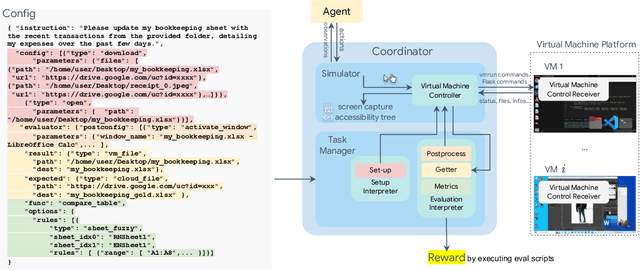
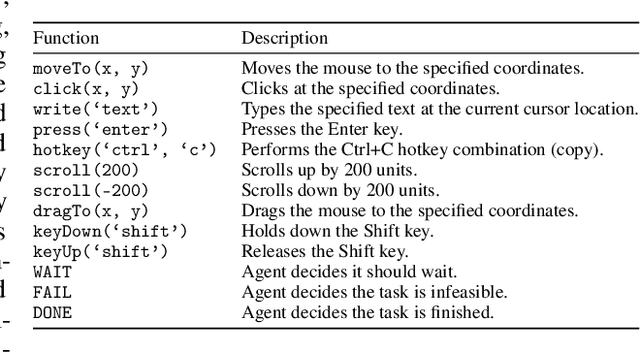
Abstract:Autonomous agents that accomplish complex computer tasks with minimal human interventions have the potential to transform human-computer interaction, significantly enhancing accessibility and productivity. However, existing benchmarks either lack an interactive environment or are limited to environments specific to certain applications or domains, failing to reflect the diverse and complex nature of real-world computer use, thereby limiting the scope of tasks and agent scalability. To address this issue, we introduce OSWorld, the first-of-its-kind scalable, real computer environment for multimodal agents, supporting task setup, execution-based evaluation, and interactive learning across various operating systems such as Ubuntu, Windows, and macOS. OSWorld can serve as a unified, integrated computer environment for assessing open-ended computer tasks that involve arbitrary applications. Building upon OSWorld, we create a benchmark of 369 computer tasks involving real web and desktop apps in open domains, OS file I/O, and workflows spanning multiple applications. Each task example is derived from real-world computer use cases and includes a detailed initial state setup configuration and a custom execution-based evaluation script for reliable, reproducible evaluation. Extensive evaluation of state-of-the-art LLM/VLM-based agents on OSWorld reveals significant deficiencies in their ability to serve as computer assistants. While humans can accomplish over 72.36% of the tasks, the best model achieves only 12.24% success, primarily struggling with GUI grounding and operational knowledge. Comprehensive analysis using OSWorld provides valuable insights for developing multimodal generalist agents that were not possible with previous benchmarks. Our code, environment, baseline models, and data are publicly available at https://os-world.github.io.
 Add to Chrome
Add to Chrome Add to Firefox
Add to Firefox Add to Edge
Add to Edge